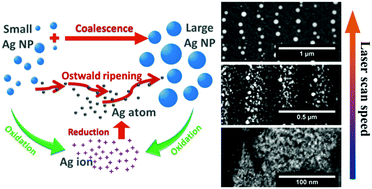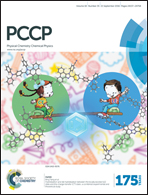Laser induced mechanisms controlling the size distribution of metallic nanoparticles
Abstract
This paper describes a model to simulate changes in the size distribution of metallic nanoparticles (NPs) in TiO2 films upon continuous wave light excitation. Interrelated laser induced physical and chemical processes initiated directly by photon absorption or by plasmon induced thermal heating are considered. Namely the model takes into account the NP coalescence, Ostwald ripening, the reduction of silver ions and the oxidation of metallic NPs, competitive mechanisms that can lead to counter-intuitive behaviors depending on the exposure conditions. Theoretical predictions are compared successfully to the experimental results deduced from a thorough analysis of scanning transmission electron microscopy (STEM) pictures of Ag:TiO2 films processed with a scanning visible laser beam at different speeds. Ag:TiO2 systems are considered for many applications in solar energy conversion, photocatalysis or secured data printing. Numerical investigations of such a system provide a better understanding of light induced growth and shrinking processes and open up prospects for designing more efficient photocatalytic devices based on metal NP doped TiO2 or for improving the size homogeneity in self-organized metallic NP patterns, for instance.


 Please wait while we load your content...
Please wait while we load your content...